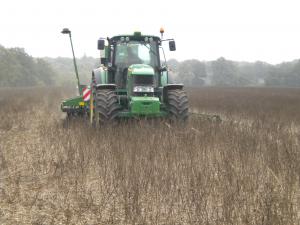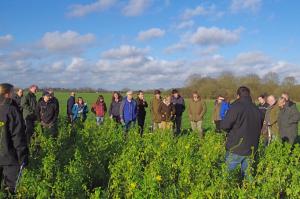UK farmers change to zero-till as rock bottom grain prices hit 2016 budgets
Zero-till is "the only way make a profit" say farmers who have been growing crops without working the soil with cultivator, plough or other implement
Crop establishment diesel goes down from £20 to £3 per acre, and there's no need for big tractors, ploughs and cultivators. Even wildlife benefits as the cover crops provide food and habitat..
ROSS-ON-WYE, UNITED KINGDOM, August 27, 2015 /EINPresswire.com/ -- With the cereal harvest in many areas of Britain more than half completed, arable farmers are thinking about their choice of crops for next season. They are finding the decisions difficult to make. The problem is that selling prices are lower now than at any time since 2010. Feed wheat is selling for an average £104.10/t and feed barley £93.70. — Mike Donovan
"I don't know what to do this autumn, because growing barley at today's price of around £90 is walking into a loss. Do I plant and hope the price will magically increase? And what if it continues to drift downwards? And if I don't grow a cereal crop, what should I do with my land?" was the dilemma put to agri economist and magazine editor Mike Donovan at a farming discussion recently.
It's a dilemma facing a great many farmers. The financial scene behind the picturesque countryside of Britain is not so pretty, and the problem is not limited to the well publicised milk and lamb enterprises.
Mike asked the questioner how he established his crops and was told he used conventional cultivations with a plough and a combination drill. His machinery was all paid for, he did a lot of the work himself and the land he farmed was not heavily mortgaged. He couldn't do it cheaper. Or could he?
"How much do you know about zero-till?" Mike asked.
"People have tried min-till around here, and it's been a right mess, weeds have been a real problem. Ploughing gets those weeds buried and out of the way, and gets a proper tilth for the seeds to germinate and get going."
Mike explained that min-till and zero or no-till are very different. Min-till disturbs soil, brings up weed seeds, uses quantities of diesel and wears parts. It's faster and cheaper than conventional ploughing, but min-till disturbs soil and changes the structure. Zero-till plants seeds with the minimum of soil disturbance, so you sometimes can't even see where you have been.
Zero-till is becoming popular across the globe, and accounts for 15% of total US cropping, while in the UK it is less than 1%. Mike's quarterly farming magazine now has an added section titled Soil+ Cover Cropping International, explaining how cover crops and zero-till work for British farmers.
The advantages are considerable. Diesel costs for crop establishment go down from £20 to £3 per acre, and there's no need for big tractors, ploughs and cultivators. Fewer tractor hours are involved and even the wildlife benefits as the cover crops provide food and habitat throughout the winter for birds and insects.
Mike sees the next crop year as being ideal for farmers to move away from Min-Till and take up Zero-Tilling. Planting conventionally is walking into a loss, as the questioner said. Getting the next crop established for a fraction of the previous cost provides the chance for a better financial outcome - the money they save should provide a financial return. Zero-tilling works season after season, as the soil condition improves and soil biology gets better.
Mike's research is done without the influence of any supply business, as his magazine Practical Farm Ideas (www.farmideas.co.uk £16.50/year) carries no advertising. It brings together relevant information from trusted sources, visits farmers who have many years experience, and describes how machinery can be adapted for better performance.
Demand for zero-tilling knowledge is expanding rapidly, as farmers realise it spells the chance for profit instead of the certainty of a loss. Mike sees the technique expanding far faster than many in farming expect, as farmers can exchange ideas and experiences so much faster than before.
Mike Donovan
Practical Farm Ideas magazine
+441994240978
email us here


